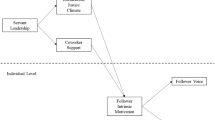Abstract
This study investigates the relationship between Machiavellianism and job performance, as measured by sales per square foot, gross margin percentage, and inventory turnover, among 60 retail store managers. Except for a significant relationship between male store managers' gross margin percentage no other relationships were observed between Machiavellianism and job performance. Several explanations for the absence of significant relationships were discussed.
Similar content being viewed by others
References
Calhoun, R. P. (1969), “Niccoli Machiavelli and the twentieth century administrator,”Academy of Management Journal, 12 (June), 205–212.
Chonko, L. B. 1982. Machiavellianism: Sex differences in the profession of purchasing management.Psychological Reports, 51:645–646.
Christie, R. & Geis, F. L. 1970.Studies in machiavellianism. New York: Academic Press.
Comer, James M. 1985. Machiavellianism and inner vs. outer directedness: A study of sales managers.Psychological Reports, 56:81–82.
Gable, M., & Topol, M. 1987. Job satisfaction and machiavellian orientation among department store executives.Psychological Reports, 60:86–104.
Gable, M., & Topol, M. 1988. Machiavellianism and the department store executive.Journal of Retailing, 64 (1):68–84.
Gable, M., & Topol, M. 1989. Machiavellianism and job satisfaction of retailing executives in a specialty retail chain.Psychological Reports, 64:107–112.
Gemmill, G. R., & Heisler, W. J. 1972. Machiavellianism as a factor in managerial job strain, job satisfaction, and upward mobility.Academy of Management Journal, 15:51–62.
Heisler, W. J., & Gemmill, G. R. 1977. Machiavellianism, job satisfaction, job strain, and upward mobility: some cross-organizational evidence.Psychological Reports, 41:592–594.
Hollon, C. J. 1983. Machiavellianism and managerial work attitudes and perceptions.Psychological Reports, 52:432–434.
Hunt, S., & Chonko, L. 1984. Marketing and machiavellianism.Journal of Marketing, 48:30–42.
Machiavelli, N. [1513] (1952).The prince, translated by W. K. Marriott, inThe prince and leviathan, Chicago: Encyclopedia Brittanica, Inc.
Machiavelli, N. [1531] (1965).Discourses in the first ten books of Titus Levius, translated by A. Gilbert, inChiefwork and others, Durham: Duke University Press.
Okanes, M. M., & Murray, L. W. 1980. Achievement among men and women managers.Psychological Reports, 46:783–788.
Topol, M. T., & Gable, M. 1988. Job Satisfaction and machiavellian orientation among discount store executives.Psychological Reports, 62:907–912.
Turnbull, A. 1976. Selling and the salesman: Prediction of success and personality change.Psychological Reports, 38:1175–1180.
Author information
Authors and Affiliations
Rights and permissions
About this article
Cite this article
Gable, M., Topol, M.T. Machiavellian managers: Do they perform better?. J Bus Psychol 5, 355–365 (1991). https://doi.org/10.1007/BF01017707
Issue Date:
DOI: https://doi.org/10.1007/BF01017707




